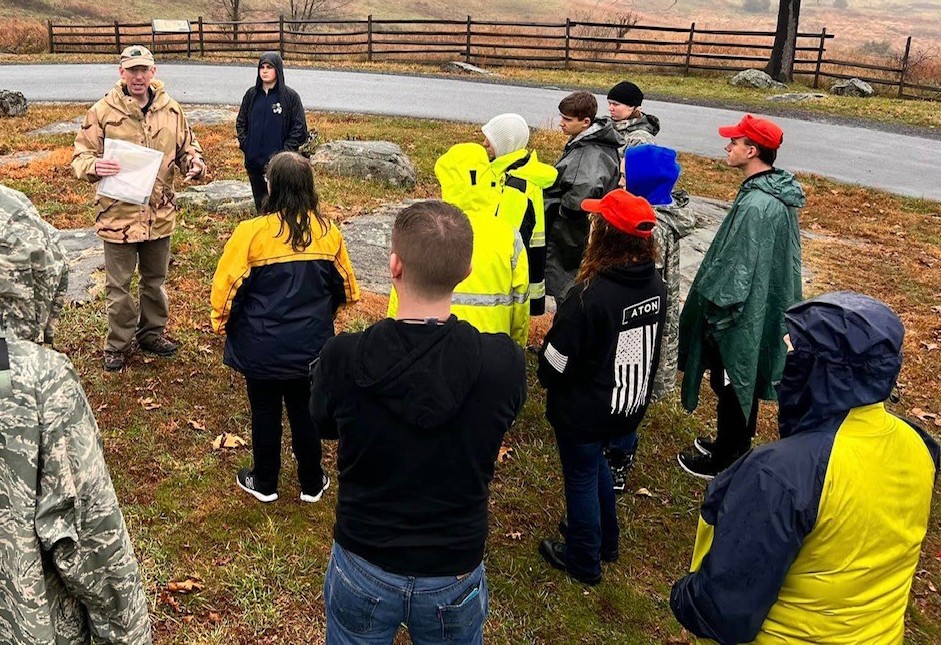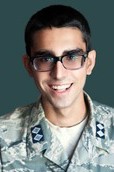Massachusetts Wing's Williams Tells Cadets: Leadership Can be Messy

 A gaggle of waterlogged Civil Air Patrol cadets huddled on the hallowed ground of Gettysburg National Military Park. Hours before, rain had fallen in buckets, just as it had on the second day of the pivotal July 1863 Civil War battle.
A gaggle of waterlogged Civil Air Patrol cadets huddled on the hallowed ground of Gettysburg National Military Park. Hours before, rain had fallen in buckets, just as it had on the second day of the pivotal July 1863 Civil War battle.
There — fittingly in soggy muck where Union and Confederate blood once soaked the soil — Lt. Col. Thomas Williams of the Massachusetts Wing taught the cadets a hard lesson:
Sometimes leadership, like life, is messy.
“Overall … what I see in the world is the world is not linear. The world is complex, full of wicked problems,” Williams said. “Most of what we teach in schools and in life and in Civil Air Patrol is linear thinking — A plus B is going to equal C. And I don’t think that’s correct.
“It’s frustrating to see people take on wicked problems. And even if they understand complexity, they still try to distill that wicked problem into something simplistic, neat and tidy. And it doesn’t work,” Williams said.
The heart of his mentoring mission to cadets rests in flexibility. It’s a goal that fits life not only in the military but also in the wider world.
“What I’m trying to do, I’m trying to teach a generation of cadets with a sense of elasticity, making cadets and units adaptive, giving them a bias for action,” he said. “I think that’s hard.”
It’s tough sledding in a world driven by algorithms and “this is the way we’ve always done it” thinking.
“People like formulas and they like answers,” Williams said. “The world seldom has answers. In fact, more often than not, when you begin to answer a wicked problem, you unintentionally create additional wicked problems.
"I try to teach people to deal with complexity as it is.”

 Williams, 58, is deputy commander for cadets of the Massachusetts Wing’s Brig. Gen. Arthur J. Pierce Composite Squadron. The retired Army reservist’s “staff rides” to historic battlefields like Gettysburg, Lexington, and Concord have become outdoor classrooms on the nature of leadership, command, and decision-making.
Williams, 58, is deputy commander for cadets of the Massachusetts Wing’s Brig. Gen. Arthur J. Pierce Composite Squadron. The retired Army reservist’s “staff rides” to historic battlefields like Gettysburg, Lexington, and Concord have become outdoor classrooms on the nature of leadership, command, and decision-making.
Staff rides have been a common professional development practice in the American military, dating back to the 19th century, when leaders visited Civil War battlefields with new officers, teaching lessons of command.
This “case study” method has transitioned into law and business schools in the civilian world.
Make no mistake: Rather than a joyride or junket, staff rides are structured education, making abstract principles concrete against the backdrop of history. Questions and ideas are the ammunition as cadets debate problems of the past and apply them to the present.
Williams hopes the debates will inspire cadets to a deeper understanding of leadership, based on moral courage, critical thinking, and striking a balance between control and empowerment.

His definition of leadership?
“Supporting agency to the people around you.”
 Teaching leadership is nothing new for Williams. As a member of the National Guard, he served in Kuwait as a battalion commander. Later, after transferring to the reserves, he taught at the Command and General Staff College. Then, after promotion to colonel, he commanded two brigades in the 75th Training Command teaching mission command.
Teaching leadership is nothing new for Williams. As a member of the National Guard, he served in Kuwait as a battalion commander. Later, after transferring to the reserves, he taught at the Command and General Staff College. Then, after promotion to colonel, he commanded two brigades in the 75th Training Command teaching mission command.
In the civilian world, Williams taught at Quinnipiac University in Hamden, Connecticut.
He’s also contributed to numerous publications, including the Military Review and the Journal of Leadership Studies.
For him, leadership is no buzzword or talisman where successes are always triumphs of leadership and tragedies caused by a lack of leadership. Such canned cliches are counterproductive, he said.
“You get people who will quote you these things — like leadership traits, leadership behaviors, leadership actions that you need to do — as if having a list is going to be enough,” Williams said. “I learned very early in my career — reading history and watching people — that perception matters more than anything. So, I began to question a lot of the prevailing theories of leadership.”
Leadership isn’t simply getting others to do what you want them to do, he said, but is something unique and quite rare. One definition from a scholar named Nathan Harter at Christopher Newport University in Newport News, Virginia, resonates.
 “[Leadership] is something that so shapes another person’s mind as to inspire a fresh template on what it means to be human,” Williams said. “I think that’s really intriguing.”
“[Leadership] is something that so shapes another person’s mind as to inspire a fresh template on what it means to be human,” Williams said. “I think that’s really intriguing.”
There’s an unexpected human element in this story. Williams is battling cancer, but he still devotes time to mentoring cadets. But for him, his fight, waged since 2014, even while teaching at the Army War College in Carlisle, Pennsylvania, isn’t the story.

“I don’t want to be known as the guy with cancer,” he said.
While his drive to mentor cadets isn’t fueled by it, Williams’ illness injects urgency into his mission.
Culture often eats initiatives for lunch, Williams said, so his objective is to foster in CAP the same adaptive mindset sought by the military. “The objective is to change the culture, so the initiatives outlast my tenure,”
He started teaching these principles in CAP during his tenure in the organization from 2006-2013, but his illness forced him to take a knee. He rejoined in late 2021 as his current medications allowed for a renewed commitment.
He sees his most important role as building connections to and supporting like-minded members.
The Boston University alumnus also uses art to celebrate the history of aviation. His paintings include thoroughbreds of American aviation like the F-15, F-16, CH-47, and C-130, and a CAP favorite, the C-182.
Williams, like so many other Civil Air Patrol volunteers, affects cadets, adult members, and senior staff alike.
Like most teachers, the self-described “proud heretic” unafraid to challenge conventional wisdom has learned from cadets. His assessment?
“They’re exceptional,” he said. “They’re incredibly thoughtful. They want to learn. They’re curious. They need to be granted permission to think and to be creative, because they’re so worried about stepping outside of the social norm, the Civil Air Patrol norm, the accepted answer.
“It’s difficult for a young person in general to be different.”

Cadet Lt. Col. Sahil Swali of the New York Wing’s Phoenix Composite Squadron., a student at the University of Toronto, has known Williams for more than a year. The two have often discussed leadership and related topics.
“He’s an amazing mentor to me and others throughout his squadron and wing,” Swali wrote in an email to CAP National Headquarters.
At the heart of Williams’ mentoring, Swali said, is “audacity.”
“He has blossomed in me the ‘audacity’ and intellectual courage to be a ‘delightful heretic’ and question my own and society’s deep-seated beliefs about leadership.”
Swali added, “Through inquiry and introspection, Col. Williams inspires throughout his wing to grow and develop as ‘leaders’”.
Swali placed leadership in quotes, he said, because he asks “What is leadership?
“It is through my ‘leadership conversations’ with Col. Williams that my curiosity is constantly reinvigorated,” Swali said. “I cannot thank him enough for his relationship over the past year and for how he never ceases to open my mind to new ideas.”
Williams advocates relentless questioning and curiosity.
“A big part of my job when I do these staff rides and when I mentor people is to give them permission to say ‘Why?’”
Williams reminds current and potential mentors that cadet programs are leadership laboratories, where kids need room to make mistakes. And the CAP tagline, “Building Lives. Building Futures” is undersold, he said.
“That’s exactly what we’re trying to do,” he said. “We can sit on the sidelines and bemoan the state of education. We can bemoan the state of young people sitting in their basements playing video games.
“Or we can get directly involved in an organization that has a proven track record of making a difference in these kids’ lives. I get involved and help where I can. I would ask everyone to do the same.”
Williams is trying to develop at every level — cadets, noncommissioned officers, officers, and cadet programs leaders — practical lessons that will endure in the years ahead, long after he’s gone.
“When the day comes that I can no longer participate, there’s enough people who understand what we’re trying to do to carry on the work.”
_____
Paul South
Contributing Writer
This profile of Lt. Col. Thomas Williams is 11th in a regular series of articles showcasing how CAP and its members make an impact throughout the nation.


